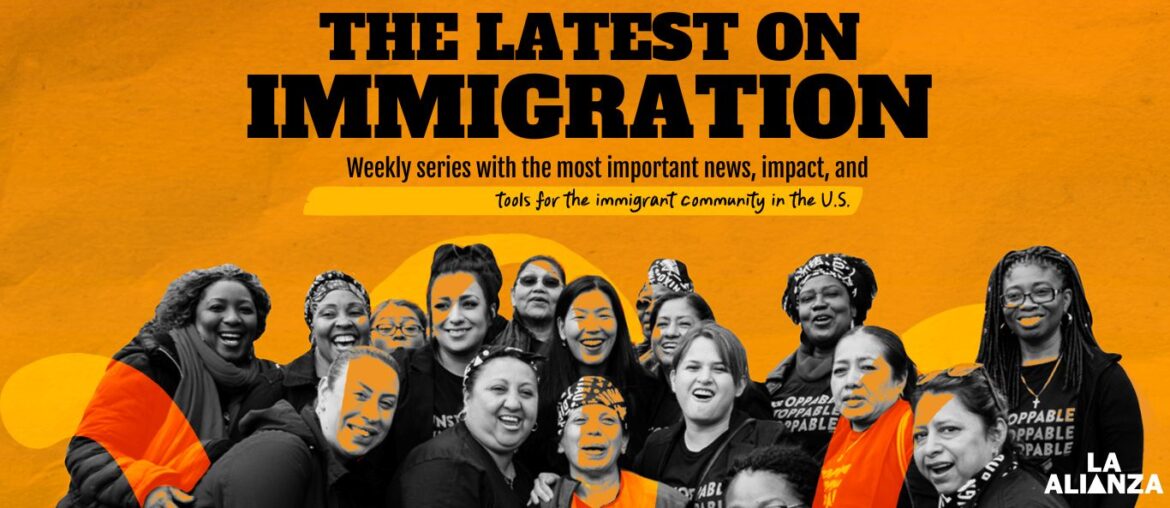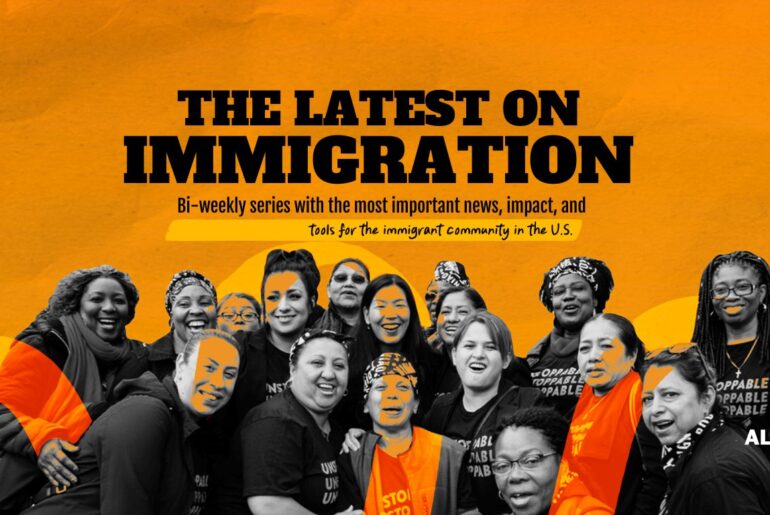This is a summary of the most important immigration news from March 26 – April 16, 2025. During this period, the US government moved forward with measures to share tax information with immigration authorities and proposed new economic sanctions on individuals with deportation orders. In addition, immigration criteria related to social media were tightened, and new mass detention operations were reported at the border.
Recent News
The IRS will share tax data with ICE: The government signed an agreement to share tax information with immigration authorities, raising concerns about confidentiality for people who pay taxes using an Individual Taxpayer Identification Number (ITIN) instead of a Social Security Number.
- What we know: The Internal Revenue Service (IRS) and the Department of Homeland Security (DHS) signed an agreement allowing Immigration and Customs Enforcement (ICE) to request tax information for immigrants with deportation orders or under criminal investigation. ICE will provide the names, and the IRS will verify whether that person is listed in its system. No data has been transferred yet, but the measure is already active. A lawsuit is underway against the US government over this interagency agreement due to perceptions of a breach of security regarding individuals’ private data.
- Why this is important: The information-sharing agreement between the IRS and ICE represents an unprecedented shift in tax confidentiality policy. Millions of immigrants have filed tax returns under the guarantee that their data will not be used for immigration purposes. This new policy breaks that promise and could not only increase the risk of arrests and deportations, but also lead to a drop in tax compliance and a spike in informal work, due to fears of being identified by immigration authorities.
- What you can do: We recommend consulting an immigration lawyer about your particular situation. You can access the NDWA attorney directory (NDWA is the partner organization of La Alianza), at the following link: https://www.domesticworkers.org/resources/immigrant-rights/find-legal-help/.
- Impact on immigrant communities: The Trump Administration has been transparent about its intention behind this private data sharing initiative: to identify and initiate deportation proceedings against individuals residing in the US without legal status. ICE’s potential access to this information—although currently limited—could not only facilitate the detention or deportation of potentially 7 million people with alleged final removal orders, but has also created a climate of fear among the immigrant population in general. The measure may also affect employment, access to public services, and people’s willingness to interact with official institutions.
Government adds migrants to Social Security death records: The Trump administration added more than 6,000 immigrants with legal status to the “death master file,” preventing them from working, opening bank accounts, or receiving public benefits.
- What we know: The White House ordered the inclusion of at least 6,300 people, mostly Latino immigrants with temporary legal status, in the Social Security database used to record deceased individuals. This database is shared with banks, insurance companies, and public agencies. The measure leaves those affected without access to essential services such as formal employment, insurance, credit, federal aid, and even their homes.
- Why this is important: The use of death records as an immigration tool marks a radical change in public policy. Critics denounce this as a strategy of “economic suffocation” to force immigrants to self-deport.
- What you can do: Those affected may request a review by the Social Security Administration (SSA), although the process can be lengthy. It is essential to seek legal advice if you are facing frozen accounts, loss of employment, or loss of benefits.
- Impact on immigrant communities: This measure is impacting the financial and emotional stability of thousands of families.
Humanitarian parole for CHNV continues: A judge blocked the Trump administration’s attempt to end a program that protects more than 500,000 Cuban, Haitian, Nicaraguan, and Venezuelan immigrants from deportation.
- What we know: The Department of Homeland Security had announced that the CHNV program would end on April 24, which would leave hundreds of thousands of people without legal permission or work authorization. However, a federal judge in Boston blocked the measure, stating that it cannot be terminated en masse without evaluating each case individually. She also suspended deportation warnings and said that ending the program early, without individual justification, “undermines the rule of law.”
- Why this is important: The ruling represents temporary relief for more than half a million people who entered legally through this program created by the Biden administration. Although the Trump administration had ordered its termination, the protection will remain in place. People will be able to remain in the country and keep their work permits until the humanitarian parole expires.
- What you can do: Those who arrived with humanitarian parole must still explore legal options with a lawyer to remain in the country after their permission expires.
USCIS tightens criteria for anti-Semitic activity on social media: The United States Citizenship and Immigration Services (USCIS) may deny benefits to those who express or have expressed support for groups such as Hamas or Hezbollah, as well as any type of anti-Semitic activity, including through online posts.
- What we know: USCIS announced that it will evaluate social media for content deemed anti-Semitic, including support for groups such as Hamas or Hezbollah. The measure applies to individuals applying for permanent residence, student visas, or immigration benefits.
- Why this is important: Civil rights groups, such as the Foundation for Individual Rights and Expression (FIRE), warned that this type of practice could be used to limit freedom of expression, especially among international students and asylum seekers.
- What you can do: Review the content of your social media accounts before submitting applications to USCIS and seek advice if you have recently participated in protests or political posts.
- Impact on immigrant communities: This policy expands surveillance of immigrants and may affect those who have been active in universities or on social media in solidarity with Palestine, even if their comments do not represent true threats.
Developing Stories and Regional News
These are stories and legislation that are developing or in the pipeline. Details could change:
- The administration proposes fining immigrants with deportation orders $998 a day: The Department of Homeland Security plans to enforce a 1996 law to fine people with deportation orders who remain in the US up to $998 per day. It is also considering seizing their assets if they do not pay. The policy has not yet been implemented. The fines could impact over 1 million people and lead to indebtedness. There are no active mechanisms in place to enforce the sanctions yet, but those with a deportation order should consult a lawyer about their status and stay informed.
- Judge keeps deportations to third countries blocked: A federal court in Boston extended the temporary suspension of the policy of deporting people to countries where they have no ties, while it considers a possible broader injunction. The judge questioned why migrants are not given the opportunity to express fears for their safety before being transferred, in some cases to places where they could face persecution.
- Cases of people posing as ICE agents are on the rise: In Florida, a man was arrested after chasing two Latino workers while pretending to be a federal agent. This type of practice has grown in different states, sowing fear in immigrant communities. Local authorities are asking people to report these cases, regardless of the victim’s immigration status.
- The Supreme Court orders facilitation of the return of immigrant deported in error: The high court ordered the government to take measures to enable the return of Kilmar Abrego García, who was sent back to El Salvador despite having judicial protection. The district judge ruled that his deportation was illegal, but so far the government has not said how it will comply with the order. The case has drawn criticism for violations of due process.
- More than 300 student visas revoked, says Marco Rubio: Secretary of State Marco Rubio stated that his office has canceled more than 300 student visas in response to activities deemed “anti-Semitic” at universities. The measure is part of a government crackdown on protests related to the war in Gaza and has been criticized by civil rights organizations.
- Columbia University student detained during naturalization interview: Mohsen Mahdawi, a permanent resident and college student, was arrested by immigration agents during his naturalization appointment in Vermont. His lawyer claims that he was detained in retaliation for his participation in protests. A federal judge temporarily blocked his deportation.
Immigration in numbers
- It is estimated that more than 13 million people live without legal status in the US, according to 2025 data cited by the Migration Policy Institute and the Pew Research Center.
- Approximately 5.1 million US citizen children live with at least one undocumented relative.
RESOURCES
- For more help, visit the National Domestic Workers Alliance’s “Know Your Rights” hub. It includes immigrants’ rights, immigration options, and a legal aid directory, among other resources. To access the information, visit ndwa.us/immigrant.
Note: The National Domestic Workers Alliance is the partner organization of La Alianza
- To identify reliable information, visit: How to identify fake news about immigration and avoid misinformation.
Legal Disclaimer: This information is provided for educational purposes and does not constitute legal advice. It is recommended that you consult with an immigration attorney to assess your specific situation.


